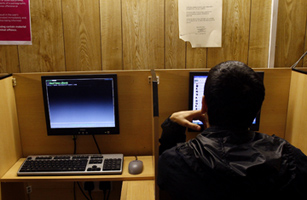By Jeffrey T. Iverson
TIME
April 10, 2010
http://www.time.com/time/world/article/0,8599,1981057,00.html
 |
| An internet cafe. In France, a television expose on cyber-predators ignited a debate over the journalist's role in the era of hidden-camera reportage. |
To say that pedophilia is a hot-button issue is an understatement. But in France, a new dose of controversy was added this week when a television expose on cyber-predators ignited a debate over journalists' ethics in the era of hidden-camera reportage. While conducting research for a program called Pedophiles: The Predators, the most recent installment of the France 2 network's hidden-camera investigative series, Les Infiltres, reporter Laurent Richard communicated with multiple alleged pedophiles online and in person — and then turned them in to the police. But in betraying his sources — repugnant as they were — did Richard and his producers betray their profession? (Read about Germany's pedophile priest scandal.)
That's the question being debated across the airwaves, news pages and web forums in France since 2.2 million viewers tuned in on April 6 to watch the program. To conduct his reporting, Richard posed online as both a 12-year-old girl and a pedophile to gain access to networks of child pornography collectors. He then traveled to Montreal to meet a convicted pedophile and secretly filmed the man as he described his plans to target more children.
From the beginning, Richard and his producer, the press agency CAPA, decided they wouldn't protect their sources following their investigation. "We knew that if we were witnesses of sexual attacks on minors we would say so," Richard told the daily Liberation newspaper. "We are not going to hide behind our press cards." Their tips led to more than 20 arrests in France and Canada, including a 64-year-old suburban Paris municipal counselor who will face child corruption charges in June for allegedly making sexual advances to the undercover journalist in a chat room. For CAPA president Herve Chabalier, the choice was clear: "We are journalists, but above all we are citizens. It's my profound conviction we had to do it."
Defending their decision, the producers cited laws obliging anyone with knowledge of imminent crimes to report them, but that doesn't convince Dominique Pradalie, secretary general of the Paris-based National Union of Journalists. "Journalists don't reveal their sources," she told the Agence France-Presse wire service. "It's a question of principle." It's also a relationship protected by law, notes Yves Bordenave of Le Monde. "Strictly respecting it allows sources [judges, criminals, politicians] to deliver journalists information, with total assurance they will never be denounced, even under court order," he wrote in the paper. By abandoning this principal, Les Infiltres has "invented a new genre in the profession: police auxiliary journalism." (How damaged is the Papacy amid the sex scandal in Catholic Europe?)
For the newspaper Humanite, this is fundamentally at odds with the most basic tenants of journalistic ethics. "A journalist worthy of the name... forbids his or herself from assuming an imaginary title or identity... and does not confuse his or her role with that of a police officer," the paper said in an editorial, citing the French journalists' code. Christian Aghroum, chief of the National Cybercrime Unit, said he feared that the journalist's actions could inspire vigilante "Internet sheriffs" to seek out suspected pedophiles on the web. "Let us do our job," Aghroum said this week during a televised debate.
Richard and CAPA insist their intention was to do just that, but that when they were told about an imminent crime, they believed they were beholden by law to alert police. Radio commentator Frederic Bonnaud says, however, that this excuse ignores the larger point. "The problem is [Richard] shouldn't have put himself in that situation in the first place," he said on Europe 1. Bonnaud described the journalist's methods as being similar to a war photographer generating a conflict between opposing factions to create a photo-op.
But is Les Infiltres a journalistic aberration to be shunned? Not necessarily, says Paris-based media critic Daniel Schneidermann. "All this doesn't mean they shouldn't have done it," he wrote on his website. "Though we still need to find a name for this practice, which fits in somewhere between police work and wildlife documentary, but which I struggle, for my part, to call journalism." (See 10 Questions for New York Times Editor Bill Keller)
Call it what you will, it's spreading. For the current issue of the weekly LeMag2 Lyon, reporters posed as churchgoers to test the reaction of priests — including the archbishop of Lyon — when faced with claims of having been raped by clergy in the past. Editor in chief Philippe Brunet-Lecomte said the reporters' methods were aimed at remedying the "crisis of credibility" facing the media today. "This type of investigation allows us to get to the truth beyond the official line," he told France INFO radio. The truth in this case was the archbishop told the journalist to go to the police. Everyone can agree that's good news. But as for whether it's good journalism, that debate seems far from over.
Any original material on these pages is copyright © BishopAccountability.org 2004. Reproduce freely with attribution.